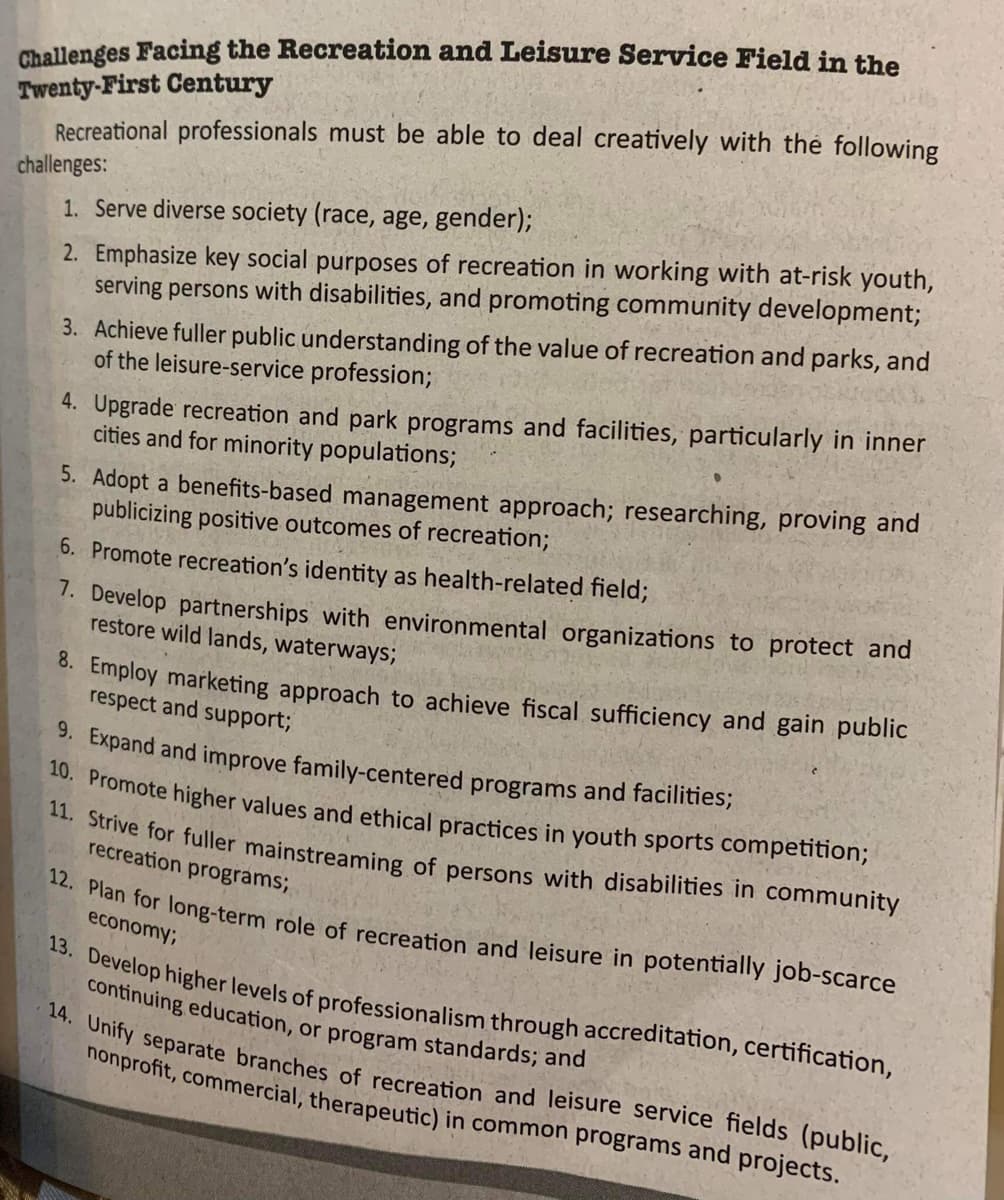Challenges Facing the Recreation and Leisure Service Field in the Twenty-First Century Recreational professionals must be able to deal creatively with the following challenges: 1. Serve diverse society (race, age, gender); 2. Emphasize key social purposes of recreation in working with at-risk youth, serving persons with disabilities, and promoting community development; 3. Achieve fuller public understanding of the value of recreation and parks, and of the leisure-service profession; 4. Upgrade recreation and park programs and facilities, particularly in inner cities and for minority populations; 5. Adopt a benefits-based management approach; researching, proving and publicizing positive outcomes of recreation; 6. Promote recreation's identity as health-related field; 7. Develop partnerships with environmental organizations to protect and restore wild lands, waterways; 8. Employ marketing approach to achieve fiscal sufficiency and gain public respect and support; 9. Expand and improve family-centered programs and facilities; 10. Promote higher values and ethical practices in youth sports competition; 11. Strive for fuller mainstreaming of persons with disabilities in community recreation programs; 12. Plan for long-term role of recreation and leisure in potentially job-scarce economy; 13. Develop higher levels of professionalism through accreditation, certification, continuing education, or program standards; and 14. Unify separate branches of recreation and leisure service fields (public, nonprofit, commercial, therapeutic) in common programs and projects.
Challenges Facing the Recreation and Leisure Service Field in the Twenty-First Century Recreational professionals must be able to deal creatively with the following challenges: 1. Serve diverse society (race, age, gender); 2. Emphasize key social purposes of recreation in working with at-risk youth, serving persons with disabilities, and promoting community development; 3. Achieve fuller public understanding of the value of recreation and parks, and of the leisure-service profession; 4. Upgrade recreation and park programs and facilities, particularly in inner cities and for minority populations; 5. Adopt a benefits-based management approach; researching, proving and publicizing positive outcomes of recreation; 6. Promote recreation's identity as health-related field; 7. Develop partnerships with environmental organizations to protect and restore wild lands, waterways; 8. Employ marketing approach to achieve fiscal sufficiency and gain public respect and support; 9. Expand and improve family-centered programs and facilities; 10. Promote higher values and ethical practices in youth sports competition; 11. Strive for fuller mainstreaming of persons with disabilities in community recreation programs; 12. Plan for long-term role of recreation and leisure in potentially job-scarce economy; 13. Develop higher levels of professionalism through accreditation, certification, continuing education, or program standards; and 14. Unify separate branches of recreation and leisure service fields (public, nonprofit, commercial, therapeutic) in common programs and projects.
Chapter1: An Overview Of Strategic Marketing
Section1.1: Cruising To Success: The Tale Of New Belgium Brewing
Problem 1VC
Related questions
Question
Please explain the photo attached asap

Transcribed Image Text:Challenges Facing the Recreation and Leisure Service Field in the
Twenty-First Century
Recreational professionals must be able to deal creatively with the following
challenges:
1. Serve diverse society (race, age, gender);
2. Emphasize key social purposes of recreation in working with at-risk youth,
serving persons with disabilities, and promoting community development;
3. Achieve fuller public understanding of the value of recreation and parks, and
of the leisure-service profession;
4. Upgrade recreation and park programs and facilities, particularly in inner
cities and for minority populations;
5. Adopt a benefits-based management approach; researching, proving and
publicizing positive outcomes of recreation;
6. Promote recreation's identity as health-related field;
7. Develop partnerships with environmental organizations to protect and
restore wild lands, waterways;
8. Employ marketing approach to achieve fiscal sufficiency and gain public
respect and support;
9. Expand and improve family-centered programs and facilities;
10. Promote higher values and ethical practices in youth sports competition;
11. Strive for fuller mainstreaming of persons with disabilities in community
recreation programs;
12. Plan for long-term role of recreation and leisure in potentially job-scarce
economy;
13. Develop higher levels of professionalism through accreditation, certification,
continuing education, or program standards; and
14. Unify separate branches of recreation and leisure service fields (public,
nonprofit, commercial, therapeutic) in common programs and projects.
Expert Solution
This question has been solved!
Explore an expertly crafted, step-by-step solution for a thorough understanding of key concepts.
This is a popular solution!
Trending now
This is a popular solution!
Step by step
Solved in 3 steps

